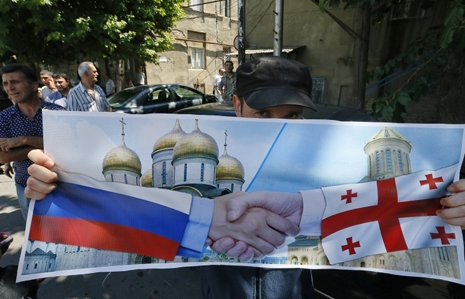Russia adds Albania, Montenegro, Iceland and Liechtenstein to sanctions list
Russian Prime Minister Dmitry Medvedev told a government meeting on Thursday that he had signed an instruction to expand a list of countries falling under Russian sanctions.
"Russia banned imports of some agricultural products from the European Union, Australia, Canada, Norway and the United States in August last year. Now, Albania, Montenegro, Iceland and the County of Liechtenstein have joined the list. Ukraine has been included in the list on special terms," the Russian prime minister said. He explained that those five new countries had previously supported the EU decision to extend sanctions against Russia.
Medvedev explained that the countries, which he mentioned, had knowingly made a decision to side with the European Union in question of extending the anti-Russian sanctions. "They said their decision to join the EU sanctions against Russia was motivated by a number of agreements with the European Union," Medvedev went on to say.
"This stance is only partly fair. I would like to note that a number of countries, which have a similar agreement with the European Union, have refused to impose sanctions against Russia. So, the decision to join the anti-Russian sanctions was a conscious choice, which means that the countries who did that are ready for the retaliatory measures, which we have imposed on them," Medvedev concluded.
Ban on import from Ukraine will come into force in case Kiev implements economic part of EU Association Agreement
Accodring to the prime minister, the ban on agricultural import from Ukraine will come into force only in case Kiev implements the economic part of the Association Agreement with the European Union.
"As far as Ukraine is concerned, the ban on agricultural supplies will only become effective in case the government of this country applies the economic part of the Agreement on Association with the European Union concluded by Kiev last June," the prime minister said. Russia gave time to Ukraine until January 1, 2016 to settle all issues of economic regulations, he added. "When this period expires and if we are not able to come to terms with mediation of the European Union, and I do not see any signs of that, earlier approved documents setting forth normal conditions of trade and embargo on foods will come into force," Medvedev said.
Moscow is concerned that implementation of the economic part of Ukraine-EU Association Agreement will disrupt existing trade balance between these countries and Russia. It will lead to losses of more than $1.5 billion for the Russian economy and will require Moscow to introduce protective measures.
The participants in the tripartite talks in Brussels on September 12, 2014 reached an agreement to postpone the entry into force of the EU Association Agreement with Ukraine until early 2016. Russia opposed the initial version of the agreement, as liberalization of trade between Ukraine and the European Union could adversely affect Russia’s foreign trade due to the fact that Ukraine, planning to enter the EU free trade area (FTA), is also member of the CIS free trade zone.
Moscow says if Kiev violates the September agreements Russia will apply to Ukraine the most favoured regime instead a more liberal regime of movement of goods within the CIS free trade area, or use other protective measures.
In July, Russia proposed to set quotas for "risk group" goods from Ukraine if Kiev implements the agreement on association with EU.
"In my opinion, we have proposed the most harmless solution. As we speak about the risk that Ukrainian goods can be driven out by the EU goods due to dumping prices, we proposed to set quotas on goods from this "risk group" taking into account their maximum export to Russia in recent years," First Deputy Economic Development Minister Alexey Likhachev said in an interview with TASS.
He added that only those volumes of goods which exceed quotas will be subject to duties and this measure does not contradict the norms of the World Trade Organization (WTO).
More about:
















































